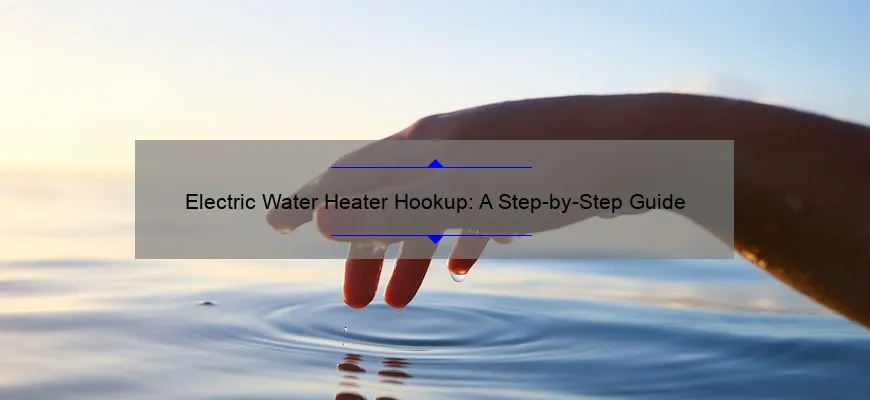Short answer how to hook up electric water heater:
To hook up an electric water heater, turn off power to the tank, connect incoming and outgoing pipes to their respective valves, attach a temperature-pressure relief valve and replace insulation cover. Finally fill up with water and turn on the power.
FAQs Answered: Addressing Common Concerns on How to Hook Up Electric Water Heaters
Electric water heaters have become an essential element of our daily lives. From taking a shower to washing dishes, we all need hot water for various purposes. Although they are reliable and efficient devices that provide consistent hot water, there are still some concerns about how to hook them up correctly.
In this blog post, we will address the most common concerns surrounding electric water heater installation and answer some frequently asked questions related to it.
FAQ #1: How much time does it take to install an electric water heater?
The installation time may vary depending upon several factors such as your existing plumbing setup, type of unit you’re installing and whether any new electrical or plumbing work is required in order for the new system to function properly. But typically speaking, professionals can complete the entire job within 2-4 hours.
FAQ #2: Can I install my own electric water heater instead of calling a professional plumber?
Although it’s possible for someone with advanced handyman skills to carry out this task on their own, we always recommend hiring a licensed plumber who has experience doing these installations. It can be quite tricky since mistakes during installation could cause significant damage like leaks or fire hazards. Professional plumbers know all the necessary codes and standards needed for proper installations; moreover, they also guarantee their workmanship via warranties providing peace of mind.
FAQ #3: Is it important that my electrician checks if my circuit breaker panel can handle an electric water heater before proceeding with installation?
Yes! Always make sure you verify electricity availability in your home prior purchasing an appliance such as an Electric Water Heater which requires sufficient amperage capacity at its designated location meaning checking circuit-breaker ratings making certain same allows Electrical connection safely .
Also crucially important – having only certified experts performing wiring connections affixed securely using conduit only compatible according building code regulations provisions associated local/government jurisdictions applying limits conform fittings/dimensions usage requirements outlined by National Electrical Code NEC guidelines governing design/installation procedures safeguarding health/well-being inhabitants building infrastructure.
FAQ #4: Should I drain my old electric water heater before removing it?
Yes! This will prevent any leaking or flooding in your home. Make sure to disconnect the electricity source and turn off the cold-water supply coming into the tank prior attempting removing old unit safely away from working area .
Also, don’t forget – like any other kitchen appliance – properly disposing of discarded units following disposal guidelines, viz-a-viz eco-friendly disposal methods adhered too internally/externally designating proper places within environment reducing carbon footprint waste management properly completed endeavor satisfying both fiscal ecological gains.
To conclude, installing an electric water heating system can be intimidating but know that a few steps are taken to ensure it’s done correctly – by persons licensed skilled trained professionally in task areas needed such as plumbing/electricity installations . By doing this right upfront allows ensuring longevity products providing services performed desired outcomes envisioned calling need updated replacement purchase saving time money headaches long run.
Top 5 Must-Know Facts on How to Hook Up Your Electric Water Heater with Ease
Electric water heaters are a popular choice for households across the globe as they offer an efficient and affordable way to heat up water for daily use. However, many people often struggle with the installation process of their electric water heaters. If you’re one of them, don’t worry; in this blog post, we’ll cover the top 5 must-know facts on how to hook up your electric water heater with ease.
1. Choose the Right Location: Before anythin gelse , it’s essential to find the right spot in your home where you’d like to install your electric water heater. The area should be near a power outlet and have enough ventilation space for safety reasons. While deciding on a location, think about accessibility as well so that if there’s any maintenance work required later on, it won’t be difficult to reach.
2. Read Instructions Carefully : Many people overlook or underestimate this step, but reading instructions carefully is incredibly important when installing an electric water heater . Most models come with clear instructions that explain every aspect of installation – from electrical requirements to plumbing connections -so take advantage of those instructions! Not only will they give you clarity throughout each step of installation , but following them strictly can prevent mishaps such as leaks or incomplete installations .
3. Safety First:
Working with electricity always comes with risks no matter how tiny or large the task may seem- therefore make sure proper precautions are taken before proceeding anywhere.
Unplug all appliances around before starting work; turn off switch boxes controlling either side circuits until work is done then lock out unauthorised males accssessing these areas while still under repairs.
Never touch anything metallic object unless you know what dangers might arise e.g shockwaves from short circuit.
Ensure adequate lighting & ventilation whenever possible so that any issues can easily be seen and corrected promptly without danger (don’t forget gloves/welders masks too)
4.Pick Your Tools Wisely: Proper tools help in completing tasks efficiently ,they do it easily and could save us some time. When installing an electric water heater, you’ll need tools such as a pipe cutter, pliers, PVC cement, Teflon tape, among others Always pick the right tool for every job.
5.Turn on Your Water Heater: finally when everything is set up accordingly as per instructions provided follow steps on instruction manual about validating thermostat setting to meet your specific needs; if need be adjust controls appropriately . Once satisfied with all settings , test run hot water supply also check different areas where there was work just to ensure no leaks are found before undertaking any serious household chores that depend on a reliable continuous access of clean filtered liquid resource.
In conclusion
Hooking up an electrical water heater can seem daunting but following these top five must-know facts will surely make it much easier if not fun! Ensure safety measures by turning off switches controlling either side circuits until work is done then lock out unauthorised males accssessing these area while still under repairs & never touch anything metallic object unless instructed how dangerous that move might become. choose location wisely keeping accessibility towards maintenance needs,equip yourself with proper tools from start till finish including picking the correct one for each task,and read through step-by-step installation guides to avoid mishaps.Apply this knowledge at home& save money while enjoying uninterrupted hot bathing experience daily !
Mastering the Process: Expert Tips for Successful Installation of Electric Water Heaters
Electric water heaters have become a popular choice for homeowners in recent years due to their efficiency, convenience and cost-effectiveness. Installing one is not as complicated as it may seem, but the process requires careful planning and attention to detail.
Here are some expert tips that can help you achieve a successful installation of electric water heaters:
1. Check your local codes – Before starting any installation work, make sure you check with your local building codes for requirements pertaining to electric hot water systems. Regulations vary from place to place so be sure you get familiarized with these regulations first and comply accordingly.
2. Choose the right size – Make sure you choose an appropriately sized water heater for your household’s needs. Apartment dwellers or small household might just require smaller tanks while increasing tank sizes would mean fulfilling larger amounts of usage
3. Location, location, location– The placement of hot-water system should also be taken into consideration; they shouldn’t interfere on any pathways or areas which could cause them disturbance such as people accidentally bumping over them causing accidents.
4. Proper Ventilation – Discharge pipes must terminate towards somewhere where pressure getting out won’t pose problems like furniture or other materials susceptible to damage by excess moisture build up i.e running down walls .
5.Drainage System– You definitely don’t want stagnant waste taking residence nearthe vicinity around your home so proper drainage system is crucial when it comes ot incinerating wastes grom discharge pipes..
6.Prepare beforehand – Prior preparation helps avoid hold-ups during actual installation . First off turn off all electrical connections before anything else.Remember that safety always comes first.
7.Plumbing expertise— Electric hot-water systems call for specific plumbing know-how therefore its pertinent engaging professional plumbers who are licensed experts in order to ensure effective installations
8 Test everything— prior heating elements being fully set up,some essential tests need be carried out once again making necessary checks and balances ensuring obviously absence of leakages and timely pressures within the system.
9. Maintenance – Regular maintenance is crucial to maintain efficiency of your hot water heater unit running at optimum levels ensuring you maximize it’s lifespan too..
Electric water heaters installation may seem daunting, but these tips will definitely make the journey smooth sailing regardless of one’s experience level with DIY installations . Remember that a well-executed hot-water system will not just improve household convenience but also benefit in terms cost-cuttings on energy costs which makes the investment well worth it in the end.

